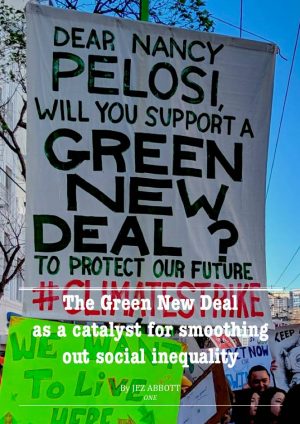 Humanity has a decade to reduce carbon emissions or face climate change devastation, reckons the Intergovernmental Panel on Climate Change. The United Nations’ group is dedicated to providing the world with a scientific – that is to say impartial, apolitical – view of climate change, its impact and how to avoid its worst effects. If ten years sounds a bum deal, there is another one on the table.
Humanity has a decade to reduce carbon emissions or face climate change devastation, reckons the Intergovernmental Panel on Climate Change. The United Nations’ group is dedicated to providing the world with a scientific – that is to say impartial, apolitical – view of climate change, its impact and how to avoid its worst effects. If ten years sounds a bum deal, there is another one on the table.
The Green New Deal has zoomed to prominence in the USA, and it credits the influence of the Intergovernmental Panel on Climate Change for the science that underpins its radical proposals. Democratic congresswoman Alexandria Ocasio-Cortez’s plan to decarbonise the American economy has been labelled by some as visionary in its scope and by others as ideologically zealous.
If the broad sweep of intent is clear, the nitty-gritty detail on implementation is less so. But the Green New Deal has given climate fresh prominence to a policy that is fast rippling beyond the USA. The UK’s New Statesman magazine, for example, believes successful implementation could transform economies around the world and ensure a liveable planet in the future.
Such ambition is hardly new. Exactly ten years ago former US president Barack Obama pushed his version of a Green New Deal into law and pumped $90 billion into ways of making electricity cleaner, fuel more renewable, and energy more efficient. But Obama has gone and Donald Trump is a notorious climate-change denier and friend of fossil fuels as well as those who mine them.
To climate cynics like Trump, the Green New Deal will throw up overwhelming costs and left-wing politics. Supporters of Ocasio-Cortez’s proposed deal, who include Democratic presidential hopefuls Bernie Sanders and Elizabeth Warren, echo the New Statesman and argue the costs of not implementing the agreement will be far worse for the USA, the planet and global economies.
Ocasio-Cortez sees her version of a Green New Deal as a catalyst for not only climate-change limitation but for smoothing out social inequality and softening the harder edges of capitalism that creates that inequality. Her tone is urgent, almost reverential. The Green New Deal, she insists, is “the ‘great society’, the moon shot, the civil rights movement of our generation”.
Climate change, pollution, and environmental destruction, she maintains, “have exacerbated systemic racial, regional, environmental, and economic injustices”. She wants the USA to be 100% renewable in electricity generation by 2030 and proposes raising marginal tax rates for the rich to 70% to pay for the ambitious new initiatives.
She also maintains the Green New Deal “should include universal health care and any other measure the committee deems appropriate for economic security”. She advocates working with farmers and ranchers to reduce the carbon footprint of agriculture. And she wants to “upgrade or replace every building in the US with state-of-the-art energy efficiency”.
The Green New Deal would also “build out high-speed rail at a scale where air travel stops becoming necessary.” and promote electric cars: the deal wants to “totally overhaul transportation by massively expanding electric vehicle manufacturing” and “build charging stations everywhere”. Ocasio-Cortez wants a new ‘select committee for a Green New Deal’ made up of both political sides that will report back in 2020 on how the renewable revolution is panning out.
On the surface, this could go a long way to reducing America’s carbon footprint. Fossil-fuel combustion is America’s biggest source of greenhouse gas emissions. Currently, every kilowatt-hour generated in the US produces an average of 0.954 pounds of CO2, according to the University of Michigan. Coal is the worst offender, releasing 2.2 pounds for every hour. Transportation meanwhile is America’s second-largest producer of emissions, producing 28% of USA’s total.
She may have captured a climate zeitgeist, while Republicans continually deny climate change, the majority of American people have come round to a viewpoint more sympathetic to Ocasio-Cortez’s. A recent study published by Yale University concluded the deal had “strong bipartisan support among registered voters” – 81% either ‘strongly support’ or ‘somewhat support’ the plan.
If the general electorate is slowly coming round, danger lurks much closer to home. Not all Democrats are convinced. House speaker Nancy Pelosi, for example, has dismissed the Green New Deal as a branding exercise: “The green dream, or whatever they call it, nobody knows what it is”. Others have criticised the omission of a key climate policy goal, the so-called carbon tax.
There is also confusion on how the Green New Deal would be rolled out and other glaring omissions. While the deal calls for achieving 100% green energy through clean, renewable, and zero-emission energy sources, it initially made no mention of nuclear power in any capacity. Some of the Green New Deal’s economic plans are also deemed untenable by all sides.
Bloomberg Opinion economics writer Noah Smith praised the deal’s focus on new technologies, the need to build a smart electrical grid, and the plan to retrofit buildings with renewable-energy systems. Yet other commitments in areas such as a federal job guarantee or universal basic income were “open-ended commitments” that risked “excessive budget deficits”.
However, writing in the New York Times, Columbia Law School professor Jeddidiah Purdy suggested such desperate problems demanded equally drastic measures regardless of the cost. Producing “the disaster of global climate change” had involved a lot of economic policy and reversing direction would take similar significant policy initiatives.
“Since environmental policy can happen only through economic policy, there is no avoiding decisions about what sorts of work there will be, and in which industries,” he wrote. “It is unsettling, but maybe a little less so when you consider that we’ve been doing it all along, usually without owning up to it.”
Rhea Suh, president of America’s Natural Resources Defense Council, agrees. In a letter to the New York Times in March, Suh spoke of the contrast between the promise of a well-crafted Green New Deal and the “folly” of doing nothing to address the central environmental challenge of our time.
Republican leaders were running out of places to hide from their “abject failure to protect our people from the rising costs and mounting dangers of climate change”, she wrote.
“First, they said it was all a hoax. As the seas kept rising, the storms kept raging and the wildfires burned out of control, they threw up their hands and whined, ‘We’re not scientists.’ Now they’ve got a new talking point: trying to fight climate change, they say, is socialism. Socialism! Nonsense.”
Suh concluded: “Some Republicans seem hellbent on putting polluter profits first, even when it means putting the rest of us at risk. It’s time to stand up and say we’ve had enough. It’s time for assertive and comprehensive action to protect our children from climate catastrophe — while we’ve still got time.”
Jez Abbott





